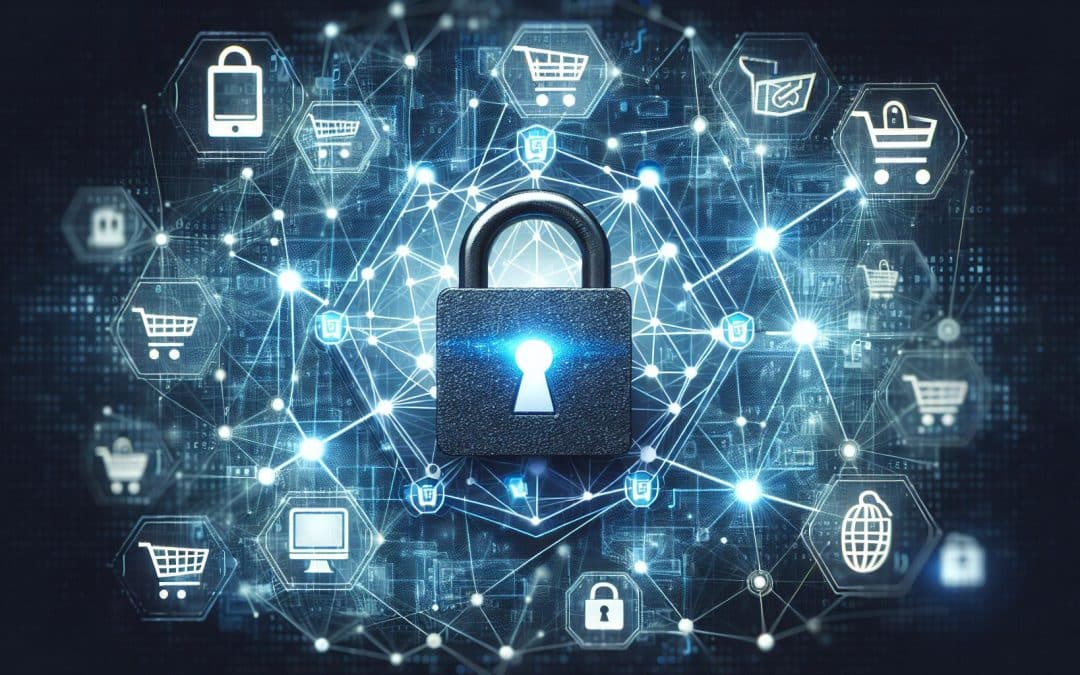In the fast-paced world of eCommerce, safeguarding your identity and data is paramount. Enter blockchain technology – a revolutionary solution that’s transforming the way we approach online security. By leveraging the power of blockchain, you can ensure that your personal information remains secure and protected while engaging in online transactions.
Blockchain’s decentralized nature and cryptographic security measures make it an ideal candidate for enhancing identity protection in the eCommerce landscape. With blockchain, you’re no longer reliant on centralized entities to safeguard your data, reducing the risk of identity theft and fraud. This innovative technology offers a new level of trust and transparency, giving you peace of mind as you navigate the digital marketplace.
Embracing blockchain for identity protection in eCommerce opens up a world of possibilities for secure online shopping experiences. Stay ahead of the curve and explore how blockchain is reshaping the future of identity security in the realm of eCommerce.
Overview of Blockchain Identity Protection eCommerce
In the realm of eCommerce, safeguarding your identity and data is crucial to ensure secure transactions. Blockchain technology emerges as a revolutionary solution offering enhanced security measures. Its decentralized nature and cryptographic protocols provide a shield against identity theft and fraud, eliminating the dependence on centralized authorities.
By leveraging blockchain for identity protection in eCommerce, you enter a world of heightened trust, transparency, and peace of mind during online shopping experiences. This transformative technology reshapes the future of identity security in the digital marketplace, offering you a secure environment to conduct transactions and engage in online retail activities confidently.
Blockchain’s core features, such as distributed ledger systems and cryptographic hash functions, fortify the foundations of eCommerce security. Your data remains encrypted and secure, significantly reducing the risks associated with malicious attacks and unauthorized access.
Transactions powered by blockchain technology are not only secure but also transparent. Each transaction is recorded on a public ledger, offering an immutable and auditable trail of activities, ensuring the integrity of the eCommerce ecosystem.
With blockchain identity protection, you have the assurance that your sensitive information is shielded from cyber threats, providing a safeguarded environment for your online interactions. Embracing blockchain in eCommerce reflects a proactive approach to safeguarding your identity and ensuring a secure digital shopping experience.
Blockchain’s impact on identity protection in eCommerce is evident through its ability to revolutionize data security practices and establish a new standard of trust in online transactions. By embracing blockchain technology, you fortify your defenses against cyber threats and pave the way for a more secure and reliable eCommerce landscape.
Importance of Identity Protection in eCommerce

In eCommerce, ensuring the security of your identity and personal data is crucial to safeguarding your online transactions. Blockchain technology offers a revolutionary solution to enhance security measures and protect your identity effectively in the digital marketplace.
When you engage in online shopping, the protection of your identity is paramount to prevent identity theft and fraud. By leveraging blockchain solutions, you can enhance the trust and transparency in your online transactions, providing you with peace of mind and confidence while engaging in eCommerce activities.
The decentralized nature of blockchain technology eliminates the need for centralized authorities, reducing the risks associated with identity security breaches in eCommerce. Through the utilization of cryptographic security measures, blockchain secures your data by encrypting it and ensuring its transparency through a shared public ledger.
By adopting blockchain for identity protection in eCommerce, you are not only fortifying your defenses against cyber threats but also setting a new standard for security in online retail. The incorporation of distributed ledger systems and cryptographic hash functions in blockchain technology strengthens the security of eCommerce platforms, ensuring secure and transparent transactions for consumers like you.
Embracing blockchain technology for identity protection in eCommerce opens up avenues to reshape the future of online security. This innovative approach not only secures your transactions but also establishes a foundation for trust and reliability in the digital marketplace, paving the way for a more secure and transparent online retail environment.
Role of Blockchain in Identity Protection
In eCommerce, safeguarding your identity is crucial to maintaining trust and security. Blockchain technology plays a pivotal role in enhancing identity protection and ensuring secure online transactions. Let’s delve into how blockchain revolutionizes identity security in the digital marketplace.
Decentralized Identity Management
Blockchain introduces a decentralized approach to identity management. By leveraging blockchain for identity protection, you can enhance security by eliminating single points of failure. With blockchain, your identity information is distributed across a network of nodes, reducing the risk of unauthorized access and fraud.
Immutable Identity Verification
One of the key strengths of blockchain is its immutability. Your identity data is cryptographically secured within blocks, making it tamper-proof. Once information is recorded on the blockchain, it cannot be altered retroactively, providing a high level of assurance in identity verification processes.
Enhanced Data Privacy
Blockchain technology prioritizes data privacy. When you engage in online transactions, blockchain encrypts your identity information, ensuring that sensitive details remain secure and anonymous. This heightened data privacy safeguards you against identity theft and unauthorized data breaches.
Transparent Identity Verification
Blockchain promotes transparency in identity verification. Every transaction recorded on the blockchain is transparent and verifiable, granting you greater control over your identity data. This transparency fosters trust between users and eliminates doubts regarding the authenticity of identities.
Resilient Security Protocols
Blockchain’s security protocols are robust and resilient. By incorporating cryptographic hash functions and distributed ledger systems, blockchain fortifies identity protection in eCommerce environments. These sophisticated security measures mitigate risks and enhance the overall security posture of online platforms.
Fraud Prevention Mechanisms
Blockchain’s consensus mechanisms and smart contracts enable proactive fraud prevention. Through automated verification processes and real-time monitoring, blockchain technology can detect and prevent fraudulent activities, safeguarding your identity and finances during online transactions.
Embracing blockchain technology for identity protection in eCommerce elevates the security standards of online retail environments. By leveraging the decentralized, transparent, and secure nature of blockchain, you can fortify your identity against cyber threats and enjoy a safer online shopping experience.
Implementing Blockchain for Enhanced eCommerce Security
When it comes to Blockchain eCommerce Solutions, implementing blockchain technology can significantly enhance the security measures of your online platform. Decentralized eCommerce Platforms that incorporate blockchain offer a robust layer of protection for your transactions and customer data.
By leveraging Secure Blockchain Transactions, you ensure that sensitive information is encrypted and stored securely across a distributed network. This not only protects against cyber threats but also fosters trust among your customers.
Integrating Cryptocurrency Payment Integration into your eCommerce system adds another level of security. The transparency and immutability of blockchain transactions make them ideal for ensuring the integrity of payment processes.
With Blockchain for Retail Transparency, you can provide a clear and auditable record of every transaction, enhancing accountability and reducing the risk of fraudulent activities.
Implementing Blockchain Distributed Ledger eCommerce allows for real-time tracking of products within the supply chain. This level of traceability not only improves efficiency but also helps in detecting and preventing counterfeit goods.
By utilizing Secure Online Transactions Blockchain, you can protect your customers from various forms of online fraud, ensuring that their data remains safe and secure throughout the shopping experience.
Incorporating Blockchain Identity Protection eCommerce mechanisms strengthens the security of user identities, making it harder for malicious entities to compromise personal information.
Adopting eCommerce Fraud Prevention Blockchain tools helps in identifying and mitigating potential risks before they escalate, safeguarding your platform and customers from fraudulent activities.
Embracing Blockchain Technology Retail Impact in eCommerce not only enhances security but also paves the way for innovative solutions that can redefine the digital shopping experience.
Future Trends in Blockchain Identity Protection for eCommerce
As eCommerce continues to evolve rapidly, incorporating cutting-edge technologies like blockchain into identity protection processes is crucial for maintaining secure transactions. Let’s explore the future trends that will shape the landscape of blockchain identity protection for eCommerce:
Enhanced Privacy Measures with Blockchain Technology
Blockchain’s decentralized nature ensures that your sensitive personal information is securely stored and managed. By leveraging blockchain for identity protection, you can expect enhanced privacy controls that restrict unauthorized access and provide a higher level of security for your online transactions.
Integration of Biometric Authentication in Blockchain Systems
The future of blockchain identity protection for eCommerce will likely see the integration of advanced biometric authentication methods. By combining biometric data such as fingerprints or facial recognition with blockchain technology, your identity verification process can become more robust and resistant to identity theft or fraud.
Immutable Identity Verification on the Blockchain
With blockchain’s immutable ledger, verifying your identity becomes a seamless process. Once your identity information is stored on the blockchain, it cannot be altered or tampered with, ensuring the accuracy and security of your personal data throughout your eCommerce interactions.
Smart Contract Implementation for Identity Management
Smart contracts are programmable agreements that automatically execute actions based on predefined conditions. In the realm of blockchain identity protection for eCommerce, smart contracts can be utilized to manage and authenticate your identity, streamlining the verification process and enhancing the overall security of your online transactions.
Decentralized Identity Management Solutions
Decentralized identity management solutions powered by blockchain technology offer a decentralized approach to identity verification. By eliminating central authorities and intermediaries, these solutions give you more control over your personal data, reducing the risk of data breaches and unauthorized access to your identity information.
Fraud Detection and Prevention Mechanisms
Blockchain-based identity protection systems are equipped with robust fraud detection and prevention mechanisms. These systems use advanced algorithms and data analytics to detect suspicious activities in real-time, allowing you to shop online with confidence and peace of mind.
By embracing these future trends in blockchain identity protection for eCommerce, you can enhance the security of your online transactions, safeguard your personal information, and enjoy a more secure and seamless shopping experience.
Conclusion
Embracing blockchain technology in eCommerce is crucial for enhancing identity protection and data security. By leveraging its decentralized nature and cryptographic features, businesses can fortify security measures, ensuring secure online transactions for consumers. Implementing blockchain offers benefits such as decentralized identity management, immutable verification, and fraud prevention, reshaping the digital shopping experience. Future trends in blockchain identity protection for eCommerce, including enhanced privacy measures and biometric authentication, promise to revolutionize security standards. Stay ahead of the curve by integrating blockchain solutions into your eCommerce platform, safeguarding customer data and payment processes. Secure your eCommerce ecosystem with blockchain technology to build trust and reliability with your customers.
Frequently Asked Questions
What is the significance of utilizing blockchain technology in eCommerce for identity and data security?
Blockchain technology in eCommerce offers enhanced identity security through decentralized management, immutable verification, privacy enhancement, and fraud prevention.
How does blockchain technology enhance identity security in eCommerce?
Blockchain enhances identity security by providing decentralized management, ensuring immutable verification, enhancing privacy measures, and preventing fraud in eCommerce transactions.
What role does blockchain play in securing transactions and customer data in eCommerce?
Blockchain technology secures transactions, customer data, and payment processes in eCommerce by leveraging its cryptographic features and decentralized nature.
What future trends can we expect in blockchain identity protection for eCommerce?
Future trends in blockchain identity protection for eCommerce include enhanced privacy measures, biometric authentication integration, immutable identity verification, smart contract implementation, decentralized identity management solutions, and advanced fraud detection and prevention mechanisms.

